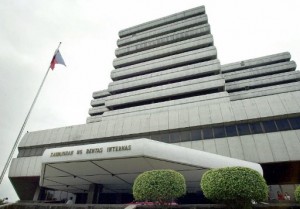The Bureau of Internal Revenue (BIR) has announced plans for more detailed audits of taxpayers suspected of hiding profits from the government as part of efforts to boost collections.
BIR collections for April, the year’s tax season, grew at a muted pace despite aggressive government campaigns to get firms and professionals to pay more.
“The BIR still believes that it will be able to recover during the remaining months of the year,” the state’s main money-maker said in a statement.
Collections for April stood at P156.1 billion, 4.78-percent higher year-on-year. However, this was the slowest growth for any month so far this year. The BIR’s revenue was also short of the goal of P176.51 billion for the month.
Alarmed by the muted expansion in collections, the BIR said it would start an “intensified” audit of books of taxpayers that paid less for the fiscal year 2013 despite posting higher revenues for the same period.
Collections were pulled down by the lower payments of large and corporate taxpayers in the National Capital Region. Although the gross revenues of these taxpayers increased, these did not translate to tax revenues as they enjoyed some forms of tax incentives, the BIR said.
The BIR called on lawmakers to speed up the passage of the Fiscal Incentive Rationalization Bill, which was earlier certified as urgent by Malacañang. The proposed measure aims to reduce excessive tax perks that companies are entitled to under existing laws.
Internal Revenue Commissioner Kim Henares said a study for the year 2011, covering 39 percent of companies that received tax perks that year, showed that the government lost P65 billion annually in income taxes due to these perks.
She said this trend likely continued for the fiscal year 2013. “Although they had growth in revenue, this didn’t translate into taxes. It’s important for us to look at these incentives,” she told the Inquirer.
The agency said this measure would be “imperative” to raising state revenues, which are needed to bankroll the Aquino administration’s expensive infrastructure program.
She said consecutive calamities in the second half of last year—chief of them Typhoon “Yolanda”—might have also contributed to slow growth in revenues.
By 2016, the government plans to spend 20 percent of its annual budget—the equivalent of 5 percent of gross domestic product (GDP)—on infrastructure projects to allow the country to catch up on its neighbors in the region.
